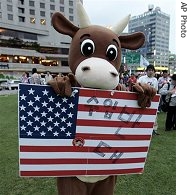-
(单词翻译:双击或拖选)
By Kurt Achin
Seoul
04 June 2008
The leader of South Korea's main political opposition1 party is accusing the United States ambassador in Seoul of insulting Koreans. The comments in question relate to an emotionally electrified2 controversy3 over resuming American beef imports. VOA's Kurt Achin reports from Seoul.
 |
| South Korean protester in a cow outfit4 holds a placard during a candlelight vigil against US beef imports in front of the Seoul City Hall, South Korea, 04 June 2008 |
Sohn Hak-kyu, chairman of South Korea's United New Democratic Party, says U.S. Ambassador to South Korea Alexander Vershbow is "impolite and arrogant5."
He says remarks like the ones Vershbow made this week are an "insult to all South Koreans." Sohn's anger was raised by the American ambassador suggesting South Koreans need to be aware of the scientific facts about American beef.
The remarks referred to what is easily the most explosive political issue of the moment on the South Korean domestic front - plans by the government to resume the import of U.S. beef.
Tens of thousands of protesters have taken to the street and blocked main traffic thoroughfares on an almost nightly basis, recently, to condemn6 the import plan. They maintain that American beef poses a risk of transmitting the fatal brain condition known as "mad cow disease."
Their insistence7 on that danger has been fueled by numerous factors: sympathy with struggling South Korean cattle farmers; anger at South Korean President Lee Myung-bak; an undercurrent of anti-American nationalism; and a tornado8 of Internet rumors9 about U.S. beef, ranging from the humorous to the hysterical10.
The one thing that has failed to back these very vocal11 protests in any significant way is hard science. One U.S. animal was found to have mad cow disease, in 2003. However, out of hundreds of millions of consumers, there has never been a single known case of mad cow-style brain infection resulting from eating American beef.
It was this absence of scientifically proven risk Ambassador Vershbow was referencing in his comments Tuesday night, made after his meeting with South Korea's Foreign Minister.
"We hope that Koreans will begin to learn more about the science and about the facts of American beef and that this issue can be addressed constructively," Vershbow said. "Clearly there is a lot of work ahead in getting people to pay more attention to the science and to the facts of the matter."
U.S. officials in Seoul have since clarified Vershbow's remark, saying the work ahead is to be done not by Koreans, but by American officials in raising public awareness12 of U.S. beef safety.
The angry response of South Korean liberal politicians illustrates13 how emotionally charged the battle lines over this issue have become. Lawmakers from a minority far-left party stood outside the U.S. Embassy in Seoul, Wednesday, demanding Vershbow apologize - warning if he does not, he might be kept out of the country, just like American beef.
 收听单词发音
收听单词发音
1
opposition

|
|
| n.反对,敌对 | |
参考例句: |
|
|
|
2
electrified

|
|
| v.使电气化( electrify的过去式和过去分词 );使兴奋 | |
参考例句: |
|
|
|
3
controversy

|
|
| n.争论,辩论,争吵 | |
参考例句: |
|
|
|
4
outfit

|
|
| n.(为特殊用途的)全套装备,全套服装 | |
参考例句: |
|
|
|
5
arrogant

|
|
| adj.傲慢的,自大的 | |
参考例句: |
|
|
|
6
condemn

|
|
| vt.谴责,指责;宣判(罪犯),判刑 | |
参考例句: |
|
|
|
7
insistence

|
|
| n.坚持;强调;坚决主张 | |
参考例句: |
|
|
|
8
tornado

|
|
| n.飓风,龙卷风 | |
参考例句: |
|
|
|
9
rumors

|
|
| n.传闻( rumor的名词复数 );[古]名誉;咕哝;[古]喧嚷v.传闻( rumor的第三人称单数 );[古]名誉;咕哝;[古]喧嚷 | |
参考例句: |
|
|
|
10
hysterical

|
|
| adj.情绪异常激动的,歇斯底里般的 | |
参考例句: |
|
|
|
11
vocal

|
|
| adj.直言不讳的;嗓音的;n.[pl.]声乐节目 | |
参考例句: |
|
|
|
12
awareness

|
|
| n.意识,觉悟,懂事,明智 | |
参考例句: |
|
|
|
13
illustrates

|
|
| 给…加插图( illustrate的第三人称单数 ); 说明; 表明; (用示例、图画等)说明 | |
参考例句: |
|
|
|















